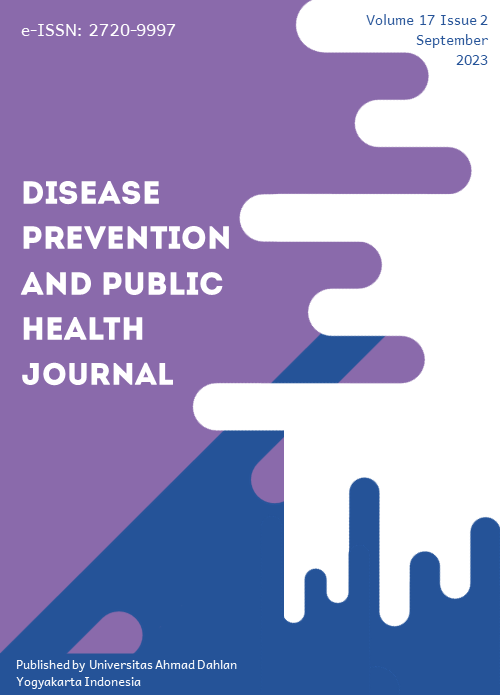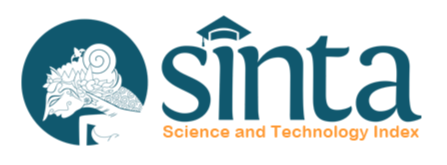Meditation Guidance, Spiritual Strengthening, and Mental Health for Patients with Covid-19: Neuroscience Approach
DOI:
https://doi.org/10.12928/dpphj.v17i2.7205Keywords:
Covid-19 patients, Disaster jurisprudence, Neuroscience, SpiritualAbstract
Background: The spread of the Covid-19 virus outbreak in early March 2020, caused a high number of deaths worldwide. People infected with Covid-19 are not only physically infected but mentally (spiritually) are also infected. In Indonesia, many hospitals in all cities and villages have been instructed to lock down (limit communication and interaction). This research focuses on analyzing neuro-spiritual as an alternative spiritual approach to improving mental health for Covid-19 patients. Method: This study uses a qualitative method (content analysis), based on case studies at Muhammadiyah hospitals throughout the city of Yogyakarta, Indonesia which are fully accredited (perfect). This study interviewed asymptomatic and symptomatic Covid-19 patients using a purposive sampling technique. The data qualitative analysis technique uses triangulation. Results: This study describes that patients suffering from Covid-19 are very diverse. Before the neuro-spiritual approach, Covid-19 patients felt constrained. The existence of a neuro-spiritual approach, namely a spiritual approach, such as fasting, night prayers (tahajjud), reading the Koran, and interacting with friends, has a good and positive impact on Covid-19 patients. A neuro-spiritual approach that prioritizes and relies on spiritual power (worship) that responds to the brain, is an alternative method used by PKU Muhammadiyah Yogyakarta. Conclusion: A neuro-spiritual approach can improve the mental health of Covid-19 patients. This approach is very relevant to the reference perspective of Islamic studies which has implications for the Covid-19 disaster in Indonesia.
References
Waterfield KC, Shah GH, Etheredge GD, Ikhile O. Consequences of COVID-19 crisis for persons with HIV: the impact of social determinants of health. BMC Public Health. 2021;21(1):1–7. doi: https://doi.org/10.1186/s12889-021-10296-9
Badra M. Towards an aesthetics of belief in covid19 pandemic time: Performatism in brian friel’s dancing at lughnasa. Int J Arab Stud. 2021;21(2):29–48. doi: https://doi.org/10.33806/ijaes2000.21.2.2
Benini F, Papadatou D, Bernadá M, Craig F, De Zen L, Downing J, Drake R, Friedrichsdorf S, Garros D, Giacomelli L, Lacerda A, Lazzarin P, Marceglia S, Marston J, Muckaden MA, Papa S, Parravicini E, Pellegatta F, Wolfe J. International Standards for Pediatric Palliative Care: From IMPaCCT to GO-PPaCS. J Pain Symptom Manage. 2022 May;63(5):e529-e543. doi: 10.1016/j.jpainsymman. Epub 2022 Jan 11. PMID: 35031506.
Haas EJ, Casey ML, Furek A, Aldrich K, Ragsdale T, Crosswy S, Moore SM. Lessons Learned from the Development and Demonstration of a PPE Inventory Monitoring System for US Hospitals. Health Secur. 2021 Nov;19(6):582-591. doi: 10.1089/hs.2021.0098. Epub 2021 Nov 9. PMID: 34757851; PMCID: PMC8796036.
Kotani H, Okai H, Tamura M. Mosque as a vaccination site for ethnic minority in Kanagawa, Japan: leaving no one behind amid the COVID-19 pandemic. Disaster Med Public Health Prep. 2022 Mar 23:1-9. doi: 10.1017/dmp.2022.78. Epub ahead of print. PMID: 35317878; PMCID: PMC9095853.
Chiaravalloti ND, Amato MP, Brichetto G, Chataway J, Dalgas U, DeLuca J, Meza C, Moore NB, Feys P, Filippi M, Freeman J, Inglese M, Motl R, Rocca MA, Sandroff BM, Salter A, Cutter G, Feinstein A; CogEx Research Team. The emotional impact of the COVID-19 pandemic on individuals with progressive multiple sclerosis. J Neurol. 2021 May;268(5):1598-1607. doi: 10.1007/s00415-020-10160-7. Epub 2020 Aug 19. PMID: 32813051; PMCID: PMC7436067.
Norbury A, Liu SH, Campaña-Montes JJ, Romero-Medrano L, Barrigón ML, Smith E; MEmind Study Group; Artés-Rodríguez A, Baca-García E, Perez-Rodriguez MM. Social media and smartphone app use predicts maintenance of physical activity during Covid-19 enforced isolation in psychiatric outpatients. Mol Psychiatry. 2021 Aug;26(8):3920-3930. doi: 10.1038/s41380-020-00963-5. Epub 2020 Dec 14. PMID: 33318619; PMCID: PMC7734389.
Qodir Z, Jubba H, Hidayati M, Abdullah I, Long AS. A progressive Islamic movement and its response to the issues of the ummah. Indones J Islam Muslim Soc. 2020;10(2):323–52. doi: https://doi.org/10.18326/ijims.v10i2.323-352
Baidowi A, Salehudin A, Mustaqim A, Qudsy SZ, Hak N. Theology of health of quranic pesantren in the time of COVID-19. HTS Teol Stud / Theol Stud. 2021;77(4):1–11. doi: https://doi.org/10.4102/hts.v77i4.6452
Suyadi, Nuryana Z, Fauzi NAF. The fiqh of disaster: The mitigation of Covid-19 in the perspective of Islamic education-neuroscience. Int J Disaster Risk Reduct [Internet]. 2020;51(2):1–15. doi: https://doi.org/10.1016/j.ijdrr.2020.101848
Sawatsky AP, Ratelle JT, Beckman TJ. Qualitative Research Methods in Medical Education. Anesthesiology. 2019 Jul;131(1):14-22. doi: 10.1097/ALN.0000000000002728. PMID: 31045898.
Xu J, Sun Z, Wu J, Rana M, Garza J, Zhu AC, Chakravarthy KV, Abd-Elsayed A, Rosenquist E, Basi H, Christo P, Cheng J. Peripheral Nerve Stimulation in Pain Management: A Systematic Review. Pain Physician. 2021 Mar;24(2):E131-E152. PMID: 33740342; PMCID: PMC8897810. doi: https://doi.org/10.36076/ppj.2021.24.e131-e152
Hennink M, Kaiser BN. Sample sizes for saturation in qualitative research: A systematic review of empirical tests. Soc Sci Med. 2022 Jan;292:114523. doi: 10.1016/j.socscimed.2021.114523. Epub 2021 Nov 2. PMID: 34785096.
Thoman DB, Yap MJ, Herrera FA, Smith JL. Diversity Interventions in the Classroom: From Resistance to Action. CBE Life Sci Educ. 2021 Dec;20(4):ar52. doi: 10.1187/cbe.20-07-0143. PMID: 34546104; PMCID: PMC8715788.
Busetto L, Wick W, Gumbinger C. How to use and assess qualitative research methods. Neurol Res Pract. 2020 May 27;2:14. doi: 10.1186/s42466-020-00059-z. PMID: 33324920; PMCID: PMC7650082.
Surzykiewicz J, Skalski SB, Niesiobędzka M, Toussaint LL, Konaszewski K. Polish Adaptation and Psychometric Properties of the Long- and Short-Form Interfaith Spirituality Scale. Int J Environ Res Public Health. 2022 Oct 14;19(20):13274. doi: 10.3390/ijerph192013274. PMID: 36293849; PMCID: PMC9602451.
Skoko I, Topić Stipić D, Tustonja M, Stanić D. Mental Health and Spirituality. Psychiatr Danub. 2021 Spring-Summer;33(Suppl 4):822-826. PMID: 35026808. doi: https://doi.org/10.1080/19349637.2022.2109241
Ushuluddin A, Madjid A, Masruri S, Affan M. Shifting paradigm: From Intellectual Quotient, Emotional Quotient, and Spiritual Quotient toward Ruhani Quotient in ruhiology perspectives. Indones J Islam Muslim Soc. 2021;11(1):139–62. doi: https://doi.org/10.18326/ijims.v11i1.139-162
Stier-Jarmer M, Throner V, Kirschneck M, Immich G, Frisch D, Schuh A. The Psychological and Physical Effects of Forests on Human Health: A Systematic Review of Systematic Reviews and Meta-Analyses. Int J Environ Res Public Health. 2021 Feb 11;18(4):1770. doi: 10.3390/ijerph18041770. PMID: 33670337; PMCID: PMC7918603.
Bensaid B, Machouche SBT, Tekke M. An Islamic Spiritual Alternative to Addiction Treatment and Recovery. Al-Jami’ah. 2021;69(1):127–62. Doi: https://doi.org/10.14421/ajis.2021.591.127-162
Suyadi, Nuryana Z, Fauzi NAF. The fiqh of disaster: The mitigation of Covid-19 in the perspective of Islamic education-neuroscience. Int J Disaster Risk Reduct. 2020 Dec;51:101848. doi: 10.1016/j.ijdrr.2020.101848. Epub 2020 Sep 15. PMID: 32953437; PMCID: PMC7490240.
Markova ОM. The Phenomenon of Musicality in Expressiveness of V . Kandinskyi Canvases. Linguist Cult Rev. 2021;5(June):303–16. doi: https://doi.org/10.21744/lingcure.v5ns2.1354
Suyadi, Nuryana Z, Asmorojati AW. The insertion of anti-corruption education into Islamic education learning based on neuroscience. Int J Eval Res Educ. 2021;10(4):1417–25. doi: https://doi.org/10.11591/ijere.v10i4.21881
Suyadi, Widodo H. Millennialization Of Islamic Education Based On Neuroscience In The Third Generation University In Yogyakarta Indonesia. QIJIS Qudus Int J Islam Stud. 2019;7(1):173–202. doi: https://doi.org/10.21043/qijis.v7i1.4922
Susanto E, Suyadi S. The Role of Parents’ Attention in the Moral Development of Children in the Amid of COVID-19 Pandemic. J Ilm Sekol Dasar. 2020;4(3):355. doi: https://doi.org/10.23887/jisd.v4i3.25536
Suyadi, Nuryana Z, Fauzi NAF. The fiqh of disaster: The mitigation of Covid-19 in the perspective of Islamic education-neuroscience. Int J Disaster Risk Reduct [Internet]. 2020;51:101848. doi : https://doi.org/10.1016/j.ijdrr.2020.101848
Naheed A, Islam MS, Hossain SW, Ahmed HU, Uddin MMJ, Tofail F, Hamadani JD, Hussain AHME, Munir K. Burden of major depressive disorder and quality of life among mothers of children with autism spectrum disorder in urban bangladesh. Autism Res. 2020 Feb;13(2):284-297. doi: 10.1002/aur.2227. Epub 2019 Oct 24. PMID: 31647184.
Suyadi S. Hybridization of Islamic Education and Neuroscience: Transdisciplinary Studies of’Aql in the Quran and the Brain in Neuroscience. Din Ilmu J Pendidik. 2019;19(2):237–49. doi: https://doi.org/10.21093/di.v19i2.1601
Apriloka DV, Suyadi S, Na’imah N. The Use of Games Virus Hunter in Pandemic COVID-19 Against Development of Early Childhood. Indones J Early Child Educ Stud. 2020;9(1):19–23. doi: https://doi.org/10.15294/ijeces.v9i1.39153
Suyadi S. Immunology Pedagogical Psychology of Pesantren Kindergarten: Multicase Study at Pesantren Kindergarten in Yogyakarta. Addin. 2019;13(1):57. doi: https://doi.org/10.21043/addin.v13i1.3510
Suyadi, Nuryana Z, Sutrisno, Baidi. Academic reform and sustainability of Islamic higher education in Indonesia. Int J Educ Dev [Internet]. 2022;89:102534. doi: https://doi.org/10.1016/j.ijedudev.2021.102534
Adeni, Hasanah S. Islam and Disaster Communication via Online Media amid the Covid-19 in Indonesia: The Case of Nahdlatul Ulama, Muhammadiyah, and the Salafism. Al-Milal J Relig Thought. 2021;3(2):153–69. doi: https://doi.org/10.30935/ojcmt/13095
Dossey L. Consilience: Are Science and Religion Compatible?. Explore (NY). 2019 Jul-Aug;15(4):245-252. doi: 10.1016/j.explore.2019.04.006. Epub 2019 May 6. PMID: 31160229.
Nurpratiwi S, Effendi MR, Amaliyah A. Improving Religious Literacy Through Islamic Religious Education Course Based On The Flipped Classroom. Istawa J Pendidik Islam. 2021;6(1):16. doi: https://doi.org/10.24269/ijpi.v6i1.3107
Jin C. Impact of the COVID-19 Pandemic on China's Stock Market Volatility, During and After the Outbreak: Evidence From an ARDL Approach. Front Public Health. 2022 May 18;10:810102. doi: 10.3389/fpubh.2022.810102. PMID: 35664100; PMCID: PMC9159152.
Downloads
Published
Issue
Section
License
Copyright (c) 2023 Universitas Ahmad Dahlan

This work is licensed under a Creative Commons Attribution-ShareAlike 4.0 International License.
Authors transfer the copyright and grant the Disease Prevention and Public Health Journal right of first publication with the work simultaneously licensed under a Creative Commons Attribution License (CC BY-SA 4.0) that allows others to share (copy and redistribute the material in any medium or format) and adapt (remix, transform, and build upon the material) the work for any purpose, even commercially with an acknowledgement of the work's authorship and initial publication in Disease Prevention and Public Health Journal. Authors are able to enter into separate, additional contractual arrangements for the non-exclusive distribution of the journal's published version of the work (e.g., post it to an institutional repository or publish it in a book), with an acknowledgement of its initial publication in Disease Prevention and Public Health Journal. Authors are permitted and encouraged to post their work online (e.g., in institutional repositories or on their website) prior to and during the submission process, as it can lead to productive exchanges, as well as earlier and greater citation of published work (See The Effect of Open Access).

This work is licensed under a Creative Commons Attribution-ShareAlike 4.0 International License.







